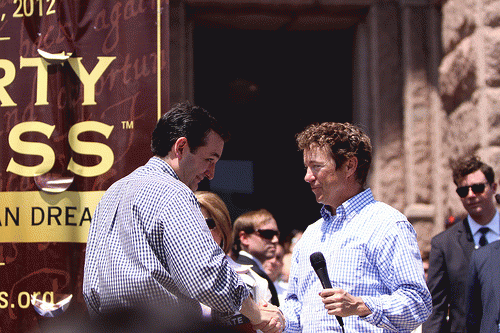Reprinted from www.alternet.org
The health care reform bills proposed by Republicans in the House and Senate have generated heated discussions across a vast ideological and political spectrum. On the right, senators such as Rand Paul and Ted Cruz have endorsed a new level of cruelty -- one that has a long history among the radical right -- by arguing that the current Senate bill does not cut enough social services and provisions for the poor, children, the elderly and other vulnerable groups and needs to be even more friendly to corporate interests by providing massive tax cuts for the wealthiest Americans.
Among right-wing pundits, the message is similar. For instance, Fox Newscommentator Lisa Kennedy Montgomery, in a discussion about the Senate bill, stated without apparent irony that rising public concerns over the suffering, misery and death that would result from this policy bordered on "hysteria" since "we are all going to die anyway." Montgomery's ignorance about the relationship between access to health care and lower mortality rates is about more than ignorance. It is about a culture of cruelty that is buttressed by a moral coma.
On the other side of the ideological and political divide, liberals such as Robert Reich have rightly stated that the bill is not only cruel and inhumane, it is essentially a tax reform bill for the 1 percent and a boondoggle that benefits the vampire-like insurance companies. Others, such as Laila Lalami of the Nation, have reasoned that what we are witnessing with such policies is another example of political contempt for the poorest and most vulnerable on the part of right-wing politicians and pundits.These arguments are only partly right and do not go far enough in their criticisms of the new political dynamics and mode of authoritarianism that have overtaken the United States. Put more bluntly, they suffer from limited political horizons.
What we do know about both the proposed Republican Party federal budget and health care policies, in whatever form, is that they will lay waste to crucial elements of the social contract while causing huge amounts of suffering and misery. For instance, the Senate bill will lead to massive reductions in Medicaid spending. Medicaid covers 20 percent of all Americans or 15 million people, along with 49 percent of all births, 60 percent of all children with disabilities, and 64 percent of all nursing home residents, many of whom may be left homeless without this support.
Under this bill, 22 million people will lose their health insurance coverage, to accompany massive cuts proposed to food-stamp programs that benefit at least 43 million people. The Senate health care bill allows insurance companies to charge more money from the most vulnerable. It cuts maternity care and phases out coverage for emergency services. Moreover, as Lalami points out, "this bill includes nearly $1 trillion in tax cuts, about half of which will flow to those who make more than $1 million per year." The latter figure is significant when measured against the fact that Medicaid would see a $772 billion cut in the next 10 years.
It gets worse. The Senate bill will drastically decrease social services and health care in rural America, and one clear consequence will be rising mortality rates. In addition, Dr. Steffie Woolhandler, co-author of a recent article in the Annals of Internal Medicine, has estimated that if health insurance is taken away from 22 million people, "it raises " death rates by between 3 and 29 percent. And the math on that is that if you take health insurance away from 22 million people, about 29,000 of them will die every year, annually, as a result."
Leftists and other progressives need a new language to understand the rise of authoritarianism in the United States and the inhumane and cruel policies it is producing. I want to argue that the discourse of single issues, whether aimed at regressive tax cuts, police violence or environmental destruction, is not enough. Nor is the traditional Marxist discourse of exploitation and accumulation by dispossession adequate for understanding the current historical conjuncture.
The problem is not merely one of exploitation but one of exclusion. This politics of exclusion, Slavoj ├... Żi├... żek argues, "is no longer about the old class division between workers and capitalists, but " about not allowing some people to participate in public life." People are not simply prevented from participating in public life through tactics such as voter suppression. It is worse than that. Many groups now suffer from a crisis of agency and depoliticization because they are overburdened by the struggle to survive. Time is a disaster for them, especially in a society that suffers from what Dr. Stephen Grosz has called a "catastrophe of indifference." The ghost of a savage capitalism haunts the health care debate and American politics in general.
What does health care, or justice itself, mean in a country dominated by corporations, the military and the ruling 1 percent? The health care crisis makes clear that the current problem of hyper-capitalism is not only about stealing resources or an intensification of the exploitation of labor, but also about a politics of exclusion and the propagation of forms of social and literal death, through what the late Zygmunt Bauman described as "the most conspicuous cases of social polarization, of deepening inequality, and of rising volumes of human poverty, misery and humiliation."
A culture of myopia now propels single-issue analyses detached from broader issues. The current state of progressive politics has collapsed into ideological silos, and feeds "a deeper terror -- of helplessness, to which uncertainty is but a contributing factor," as Bauman puts it, which all too often is transformed into a depoliticizing cynicism or a misdirected anger fed by a Trump-like politics of rage and fear. The fear of disposability has created a new ecology of insecurity and despair that murders dreams, squelches any sense of an alternative future and depoliticizes people. Under such circumstances, the habits of oligarchy and authoritarianism become normalized.
Traditional liberal and progressive discourses about our current political quagmire are not wrong. They are simply incomplete, and they do not grasp a major shift that has taken place in the United States since the late 1970s. That shift is organized around what Bauman, Stanley Aronowitz, Saskia Sassen and Brad Evans have called a new kind of politics, one in which entire populations are considered disposable, refuse, excess, and consigned to fend for themselves.
Evidence of such expulsions and social homelessness, whether referring to poor African-Americans, Mexican immigrants, Muslims or Syrian refugees, constitute a new and accelerated level of oppression under casino capitalism. Moreover, buttressed by a hyper-market-driven appeal to a radical individualism, a distrust of all social bonds, a survival-of-the-fittest ethic, and a willingness to separate economic activity from social costs, neoliberal policies are now enacted in which public services are underfunded, bad schools become the norm, health care as a social provision is abandoned, child care is viewed as an individual responsibility and social assistance is viewed with disdain. Evil now appears not merely in the overt oppression of the state but as a widespread refusal on the part of many Americans to react to the suffering of others, which is all too often viewed as self-inflicted.
Under this new regime of massive cruelty and disappearance, the social state is hollowed out and the punishing state becomes the primary template or model for addressing social problems. Appeals to character as a way to explain the suffering and immiseration many people experience are now supplemented by the protocols of the security state and a culture of fear.
(Note: You can view every article as one long page if you sign up as an Advocate Member, or higher).






